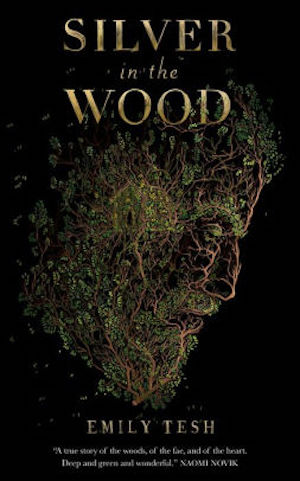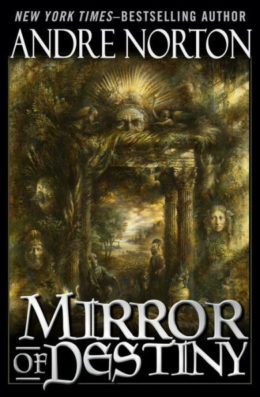The second installment of the Five Senses series looks at the power and magic of sight—in both its presence and absence. It’s an odd, often confusing, sometimes compelling story. I alternated between a fair amount of Oh Yeah! and an equal proportion of Nooooope.
The plot is best summed up as Year of the Unicorn meets Judgment on Janus.
Orphaned Twilla is apprenticed to the Wisewoman Hulde, studying the healing arts and polishing Hulde’s gift, an ancient, magical mirror. The mirror is Twilla’s destined magical tool, if she can learn to use it. She gets no instruction from Hulde, except to keep polishing it every day, chanting a little jingle. We’re told very earnestly that it is a jingle and it’s childish and great poetry it is not, but it’s what the mirror wants.
I wonder if Norton had had some stinging reviews? Or if she’d taken to heart the ones about other authors’ less than stellar poetry? Anne McCaffrey got a lot of that. So, a couple of decades before, had Katherine Kurtz. Whatever the reason, every time Twilla makes up a chant to activate the mirror, we’re told again that it’s a jingle and childish but that’s what the mirror wants.
In any case, the setup is brisk and the reversal almost immediate. Twilla is forcibly conscripted by the king and hauled over the mountains to a colonial outpost, where she is to be married off by lottery to one of the male colonists. Year of the Unicorn reference, check.
Twilla tries to get herself exempted because of her Healer’s training and her unfinished apprenticeship, but the king’s press gang has orders not to let her off. There’s mention of a dark priesthood that will be important later, the cult of a being called Dandus. Hulde makes no effort to stop them. Twilla is bundled into a wagon with a handful of other conscripts, all of whom she (and we) gets to know.
But Twilla is not about to surrender, especially after she learns why women (mostly of middle class or lower—the wealthy have the means to avoid the draft) are being forced into marriage. The colony has been logging and mining, stripping the country and shipping the results back to the kingdom, which has exhausted its own agricultural and natural resources. Unfortunately for the colonists, and by extension their unwilling brides, men who venture into the forest have been coming back blind and stripped of their wits. Only married men are exempt. Therefore, the men must marry. They don’t have any more choice than the women they’re bound to.
There is no way Twilla wants to marry anyone, let alone a man forced on her by lottery. She tries an experiment with her mirror, to see if she can change her appearance, giving herself an illusory case of, essentially, smallpox (therefore horribly disfiguring and infamously contagious). That way, she figures she’ll be rejected out of hand, and then she can convince the colonial lord to let her practice her Healer’s calling.
The experiment succeeds, but the plan does not. The colonists are desperate. The lord’s own heir has come back from the forest blind and is now regarded as an “unman.” His second son has been forced into the lottery.
Of course he draws Twilla. But he doesn’t want her any more than she wants him. Unfortunately he is a truly horrible person and a devotee of Dandus, whose priest effectively controls the colony. The priest is an active enemy of Twilla’s school of magic.
The only way the lord’s son can escape the marriage is to render Twilla unusable as a wife. And that means total dishonor by serial rape.
That was my first big, big, big NOPE.
Also a cause to reflect on the year Mirror of Destiny was published. It first came out in 1995. Rape was a frequent plot driver in the Nineties, long before #MeToo and right after the Anita Hill hearings in 1991. From Outlander that same year through A Game of Thrones in 1996, with many a lesser novel before and between and thereafter, sexual violence, especially against women, was a staple.
At the time we accepted it. It was the way things worked. If we were “lucky” the hero, like Jamie Fraser, would get the same treatment. It was awful and harrowing and dramatic and it happened in novel after novel.
Even Andre Norton, whose books for the most part barely acknowledge the existence of sex, seems to have fallen prey to the Zeitgeist. But she doesn’t follow through with it. Twilla escapes in the very nick of time, thanks to a grubby, awkward, mostly helpless but still rather indomitable male person who overwhelms the would-be rapist and gets her out of durance vile and into the wilderness.
This is, of course, the former lordly heir, Ylon. Ylon is fairly compos mentis, and Twilla quickly determines that his blindness is magically induced. He doesn’t remember what caused it. All she knows is that he went into the forest and came back in this condition. There are monsters in the forest, the colonists declare, but they don’t touch married men. There’s even a rumor that the monsters are green. And there are giant trees that the colonists have been trying to take down. Judgment on Janus, check.
Once Twilla and Ylon escape the fort, they embark on a long and complicated adventure. The forest is occupied by tall, pale, very long-lived, tree-dwelling people who teleport hither and thither in a cloud of silver mist. They’re surrounded by glittering treasures, accompanied by tiny sprites and flying lizards (a nod to McCaffrey’s fire lizards?), and one of them has gone to the dark side. She’s the one who’s been blinding unmarried human men and driving them mad.
Twilla and her magic mirror quickly forge an alliance with the ok-they’re-elves, come into deadly conflict with the wicked elf-witch who blinded Ylon, and free a subterranean nation of “small men” who have been turned into fungi. These ok-they’re-dwarves can work metal, including the iron that is fatal to the elves. Twilla brings them together to oppose the humans who are destroying the forest with their iron axes and stripping the earth of its minerals with their mining operations.
As a Healer she wants to heal them all and make peace, but she also wants to heal Ylon. Unfortunately the elves’ law is unbreakable: Only the person who cast the spell can break it. Unless she can persuade or force the witch to give Ylon back his sight, he’ll continue to be a poor, nearly helpless, profoundly disabled “unman” whose people despise him and treat him abominably.
And that was my second big giant NOPE. It’s one thing if this toxically patriarchal society is also toxically ableist. This is a Message Novel, and one of the messages is that patriarchy is bad. Forced marriage, rape, and sexism of all sorts are Very Bad Things, a woman should be able to choose a career over a man, and female friendship is a real and important thing.
The way Ylon is treated is of a piece with the way the king and his deputy treat the women conscripted into marriage. It’s bad, and the evil Dandus and his followers are making it worse, and they’re allied with the dark sorceress in the wood to conquer every good thing and turn the world into a toxic wasteland.
Which would be well and good except that, late in the novel, when the evil witch is vanquished before Twilla can make her give Ylon back his sight, Twilla becomes very, very angry. Blindness is awful. Blindness is terrible. A blind man is maimed and doomed and incomplete.
And that’s just as bad and just as ableist as Ylon’s family and his people reducing him to nonexistence because of his disability. Twilla might be angry at herself because she wants to heal him and can’t, and at the elves because they could heal him but they won’t break their law, but to be angry because the disability makes him less of a viable person is just, no. We’re told over and over that he can’t do things, that she has to keep doing things for him.
Buy the Book


Silver in the Wood
Yes, he does gain confidence as the story unfolds. He frees himself from the rest of the magic that binds him. He has adventures and does heroic things and sometimes rescues Twilla. But his blindness is this awful, horrible, terrible thing that has, has to be cured, and what that says to and about actual blind people who may be reading this book is nothing short of hurtful. It tells them their disability makes them less than sighted people, that if it can’t be cured it’s intolerable, and that they can’t ever be as capable as sighted people. Blind people are not whole and that is awful.
It’s sightist, and it’s pushed all the way over the top. And I say NOPE.
It is too bad, too, because the novel hits so many other sweet spots. Preserving the natural environment. Conserving resources. Different ethnicities and species working together. Gender equality among the elves and dwarves, and a revolution among the humans, as Twilla persuades her friends and colleagues (with the help of elvish magic) to rise up against the patriarchy. It’s a big, messy, confusing tangle of good, bad, and ugly, with some lovely bits and some very not-lovely bits. In the end, I don’t think I’ll want to read this one again. Once was enough.
Next up is The Scent of Magic. It should be interesting, I hope in a good way.
Judith Tarr’s first novel, The Isle of Glass, appeared in 1985. Her most recent novel, Dragons in the Earth, a contemporary fantasy set in Arizona, was published by Book View Cafe. In between, she’s written historicals and historical fantasies and epic fantasies and space operas, some of which have been published as ebooks from Book View Café. She has won the Crawford Award, and been a finalist for the World Fantasy Award and the Locus Award. She lives in Arizona with an assortment of cats, a blue-eyed dog, and a herd of Lipizzan horses.










